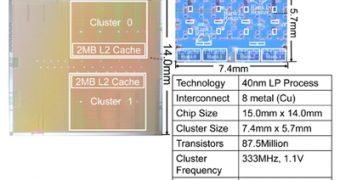Toshiba's fastest multi-core system-on-chip device, originally launched in 2008, has been clearly bested by the new SoC, one with eight times the number of cores and 14 times the performance.
The company has introduced a System-on-Chip device with no less than 64 cores, divided into two 32-core clusters.
Measuring 209.3 square millimeters, the many-core SoC has 2 MB level-two cache memory for each cluster, shared among the processor cores through a tree-based network-on-chip. The product also integrates a dual-channel DDR3 memory controller.
Toshiba's press release says that “the new many-core SoC secures 1.5 tera operations per second at 333MHz, a processing rate 14 times faster than that of its eight-processor multi-core predecessor.”
The claim becomes doubly intriguing when the power consumption benefits are factored in. If what Toshiba says is true, then the newcomer is 50% more power-efficient than the 8-core predecessor, and only part of this is owed to the 40nm manufacturing process.
The rest stems from multi-level power gating, clock gating and Toshiba's proprietary low power data-mapping flip-flop circuit.
Not only that, but the corporation even pairs the SoC with parallelized firmware for multimedia applications.
MPEG4-AVC/H.264 1080p 30fps decoding should make do with under 500mW of power, while super resolution 4K2K 15fps image processing can run at under 800mW.
Toshiba expects the newcomer to be used in automotive and digital consumer products, particularly when high-speed over-HD (high definition) resolution image processing and recognition have to be performed.
“Recent advances in multimedia processing, including video encoding and decoding and image recognition, have relied on multi-core processors that combine high performance with low power consumption,” Toshiba said.
“Many-core processors go a step further; by increasing the number of cores they boost SoC performance to much higher levels. However, the power consumption and size of many-core SoC have been problems for their use in embedded applications. Toshiba's many-core SoC secures significant advances in performance while maintaining low power consumption and a cluster size of 84 mm2 , suitable for embedded applications.”

 14 DAY TRIAL //
14 DAY TRIAL //